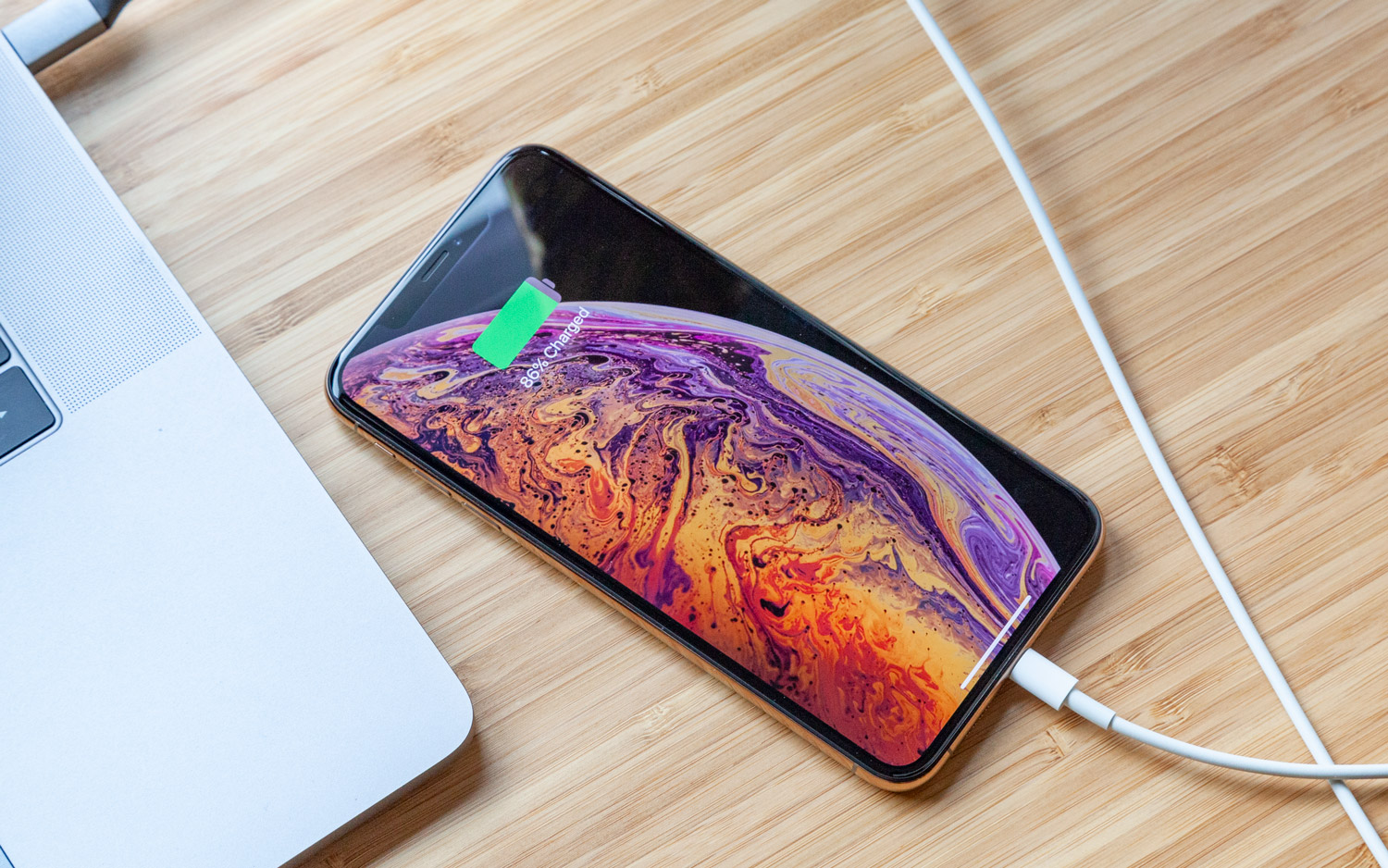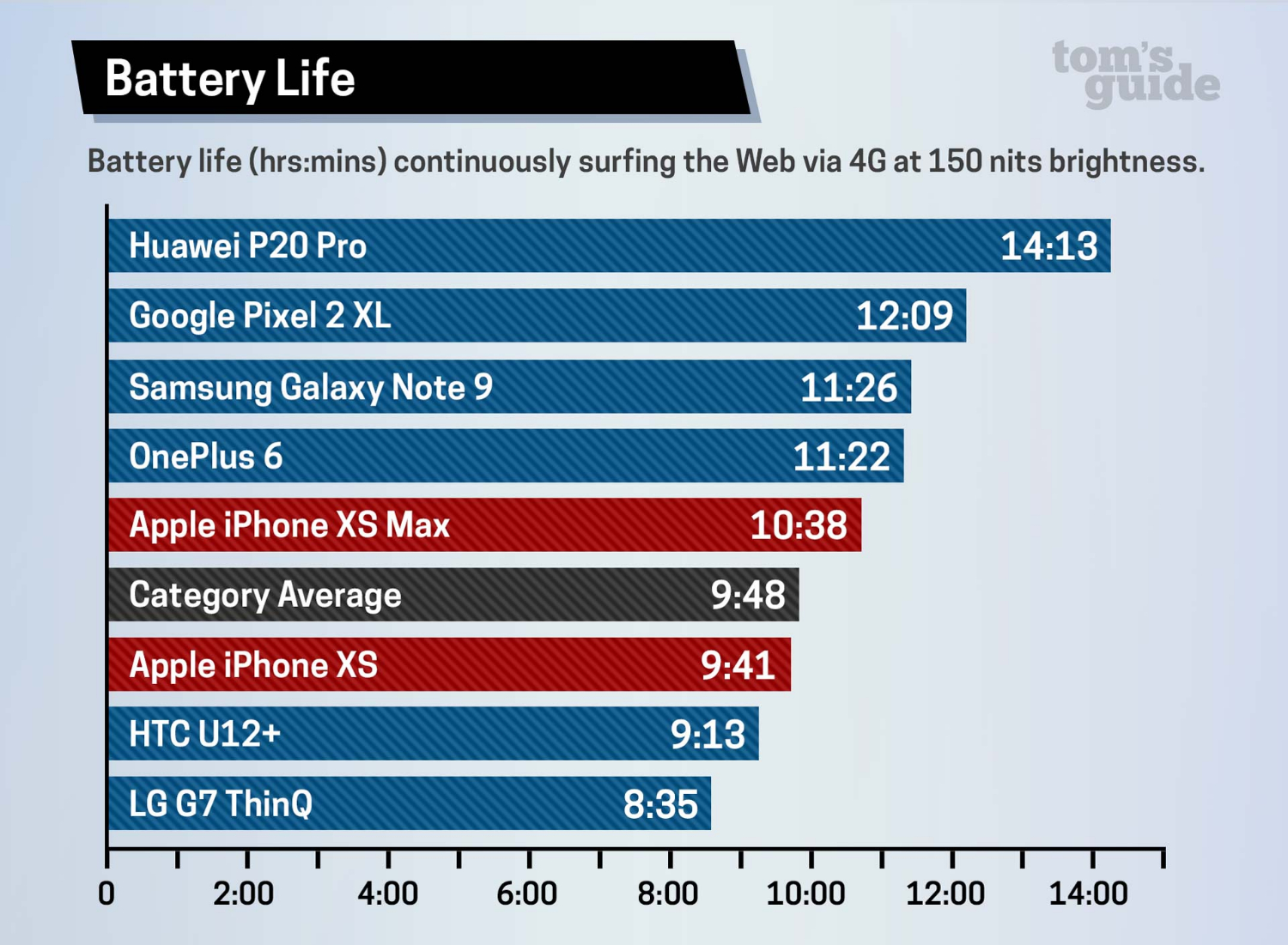iPhone XS and XS Max Battery Life: The Results Are In
Apple's new iPhones offer pretty good battery life, but the best Android flagships last longer on a charge.
Update Sept. 28: We've updated this story with a new battery result for the older iPhone X and additional context around Apple's iPhone XS battery life claims.
If you really care about battery life and you're in the market for a new iPhone, we would opt for the iPhone XS Max over the iPhone XS. Apple's 6.5-inch flagship lasted nearly an hour longer on a charge than its smaller, 5.8-inch sibling.

On the fence between Android and iOS? You can get considerably better endurance from Android phones, especially those with larger batteries.
iPhone XS and iPhone XS Max: Their Battery Life vs. Competition's
| Phone | Battery Life (Hours: Minutes) |
| iPhone XS Max | 10:38 |
| iPhone XS | 9:41 |
| iPhone X | 9:51 |
| Huawei P20 Pro | 14:13 |
| Google Pixel 2 XL | 12:09 |
| Galaxy Note 9 | 11:16 |
| OnePlus 6 | 10:33 |
| Smartphone Average | 9:48 |
| HTC U12+ | 9:13 |
| LG G7 ThinQ | 8:35 |
We put the iPhone XS and XS Max through the Tom's Guide Battery Test, which involves continuous web surfing at 150 nits of screen brightness. For this test, we turn Auto-Brightness off and True Tone off in the display settings.
To ensure consistency, we run all of our phone battery tests on T-Mobile's network, and we ensure that the phones have full signal strength by using a signal booster called the T-Mobile 4G LTE CellSpot. In other words, this is as close to ideal conditions as we can get while keeping everything repeatable.

The iPhone XS Max turned in a run time of 10 hours and 38 minutes, which is well above the smartphone category average of 9:48. However, the iPhone XS lasted for just 9:41, which is slightly below the average.
Last year's iPhone X lasted 10:49 on the same test, despite claims from Apple that the iPhone XS was supposed to last 30 minutes longer. However, that claim is based not on web surfing but a mix of real-world activities a given user might do throughout the day.
Interestingly, when we ran the older iPhone X through our battery test again, it achieved a runtime of 9 hours and 51 minutes. That's still better than this year's iPhone XS, but not by much.
MORE: Smartphones with the Longest Battery Life
Why the big drop year over year? Part of it could be the age of the phone, but the battery capacity said 100 percent in the battery health settings of the handset. It could be that the same websites we used in last year's test have injected more Javascript and other code on their pages, which could place more stress on the phones.
Both new iPhones beat certain Android phones, such as the HTC U12+ (9:13) and LG G7 ThinQ (8:35), but they were outclassed by other Android flagships in this category.
Google's Pixel 2, for example, lasted 12 hours and 9 minutes on our test, while the Huawei P20 Pro endured for more than 14 hours. The Galaxy Note 9, which packs a 4,000-mAh battery, lasted a very good 11:16, which is nearly 40 minutes longer than the iPhone XS Max lasted.
Based on a recent teardown, the iPhone XS has a relatively small battery compared to most Android phones, at 2,659 mAh, which is smaller than the 2,716-mAh battery in last year's iPhone X. The iPhone XS reportedly packs a beefier, 3,179-mAh battery, but that's still less than what most Android flagships have, ranging from 3,500 to 4,000 mAh.
To be fair, the size of the battery is only one factor in a phone's battery life. The software, processor and other aspects also come into play. In fact, the 7-nanometer A12 Bionic chip in the new iPhones has four efficiency cores that are designed to be up to 50 percent more efficient than the A11 Bionic.
But based on our results, the iPhone XS and iPhone XS Max don't have the staying power of the best Android phones when it comes to our web surfing test.
Credit: Tom's Guide
Sign up to get the BEST of Tom's Guide direct to your inbox.
Get instant access to breaking news, the hottest reviews, great deals and helpful tips.
Mark Spoonauer is the global editor in chief of Tom's Guide and has covered technology for over 20 years. In addition to overseeing the direction of Tom's Guide, Mark specializes in covering all things mobile, having reviewed dozens of smartphones and other gadgets. He has spoken at key industry events and appears regularly on TV to discuss the latest trends, including Cheddar, Fox Business and other outlets. Mark was previously editor in chief of Laptop Mag, and his work has appeared in Wired, Popular Science and Inc. Follow him on Twitter at @mspoonauer.
-
Mark Spoonauer Reply
Hi @thesteves. Thanks for the question. We tested the Note 9 at its default screen resolution.21348980 said:Which resolution did you set the galaxy not 9 screen to?
-
datmh2105 This result is totally different from some battery test I have watched on YouTube, which show that the battery life of iPhone XS MAX is equal to Note 9 when Note 9 resolution is set to FullHD+, and longer in 2KReply -
danieldynasty which ios was the iphone x test run with? can you re-run the test on the iphone x on ios 12 for a true apples to apples comparison?Reply
there are not enough details on how the test was conducted. was the iphone xs able to view more pages in the test than the iphone x due to its A12 chip? -
zerocoolspain @danieldynasty That is the question!! iPhone X running iOS 11, iPhone Xs running iOS 12Reply -
varase If you're just looping through a browser, loading a new page when the last page completes rendering, you could be punishing faster phones in your testing methodology.Reply
Say phone A is twice as fast as phone B.
If you're just looping as stated above, phone A is putting in twice the work of phone B per hour, which of course will use more resources.
Web page loading is a variable resource task - the faster the phone, the higher the rate of resource utilization - unlike playing a video, which uses the same resources for both phone A and phone B (provided both phones are capable of playing the video).
If phone A taks 20 seconds max to load a page and phone B takes 40 seconds, the only fair way to compare battery life would be to request a new page every 40 seconds - but in real world usage even that is fallacious.
In the real world, a user might browse a dozen pages, consume content, and put his/her phone back to sleep.
Some pages would begin to load and the user might hit a link without waiting for the page to completely load; for other pages, the user might find something of interest and the phone would load the page and simply idle as the user consumed the content at human speed.
So, what's the trigger you use to load the next page? A realtime wait, or a continuous loop? -
pradeepkumarkota IOS 12 and 12.0.1 has really sucked my Iphone 6S phone and its battery. The upgrade has also resulted in my iphone 6S Charging port n Battery damage. I had to spend huge amount of money to get this fixed. Apple is intentionally provoking customers to upgrade to their new phones and their prices are unrealistic. I believe this is very much intentional game. Apple, instead focus on giving better battery life not on your papers n claims. Instead, focus on giving better battery life on all devices and compare your battery life with Android small players. I believe you will loose your bet.Reply -
varase Reply
I think you have to come to the realization that nothing lasts forever, and your battery is definitely one of those things. You can still get this fixed for $30 until the end of the year.21446117 said:IOS 12 and 12.0.1 has really sucked my Iphone 6S phone and its battery. The upgrade has also resulted in my iphone 6S Charging port n Battery damage. I had to spend huge amount of money to get this fixed. Apple is intentionally provoking customers to upgrade to their new phones and their prices are unrealistic. I believe this is very much intentional game. Apple, instead focus on giving better battery life not on your papers n claims. Instead, focus on giving better battery life on all devices and compare your battery life with Android small players. I believe you will loose your bet.
As for iOS 12 damaging your charging port: it's software - it doesn't break charging ports.
So ... what happened to your phone, and what did they do to fix it, and at what cost?

